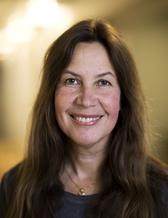- Home
- News and events
- Find news
- Maria Sundin is awarded the Faculty of Science's 2023 Synergy Award
Maria Sundin is awarded the Faculty of Science's 2023 Synergy Award
Maria Sundin is an outstanding, inspiring and extremely active spreader of knowledge. She can create seamless interdisciplinary connections between astronomy and fields such as art, history, music and sports. Now she is awarded the Faculty of Science's 2023 Synergy Award for her for contributions within community outreach.

How does it feel to receive the 2023 Synergy Award?− I am really happy! The dean called me and told me just a few minutes before I was to lecture, so I didn't have time to digest the news. It was probably an extra energetic lecture about astronomy and art. It means a great deal that my efforts in community outreach is being noticed. It proves that I'm doing something good and gives inspiration to keep going.
What community outreach are you up to now?
− Next on the agenda in the autumn are two programmes for GoKväll at SVT in Umeå, the Nobel Prize Museum's podcast Ideas that change the world and a lecture for high school students interested in physics at the Lise Meitner days in Stockholm. Recently, I was also filmed for an upcoming documentary about UFOs on TV4 together with Felix Herngren, where I talk about my scientific view of the phenomenon. It airs in the spring. Furthermore, I have had long-term collaborations with P4 Extra in Gothenburg, GoKväll at SVT, Christer and Morgan report in P3, Alltinget under the leadership of Lasse Swahn and the Nobel editorial team at SVT. It has been a great school to attend! In addition, during the year I made my debut as an author with a short factual book about riding schools. I have two more contracts for upcoming books. There will be one more on horses in 2024 and one in astronomy in 2025. The writing is separate from my employment, but is another way to spread knowledge.
How do you view your work on community outreach?
− I have had time to reflect a lot on why I do community outreach. The most important, and basically decisive, reason is that I think astronomy and physics are important subjects and I want to take every chance to arouse interest and tell about what's going on. Another reason is to make people happy. From what I've heard, many people feel good about being able to think about completely new and exciting things that don't touch a relatively polarized society with gloomy messages. Talking about galaxies is not so sensitive, so most people can do that together. It creates optimism and faith in the future to show what positive and difficult things humanity can handle. Additional reasons are that the university is made visible, to be seen as a female physicist and, at best, to be a role model. The BBC has had the words "inform, educate and entertain" in its mission, and I try to bring those parts to different target groups in different ways.
What challenges do you see with outreach?
− Among the most difficult things is that much cannot be planned. Often a journalist calls and wants quick answers no matter what my schedule looks like. Basically, I'm not really interested in being seen. That's usually not why you become a physicist, I think. For me, the most important thing is that the knowledge gets out, not that it is me who brings it out. Therefore, I'm a little extra happy that I might attract a lot of questions because of my experience, and I'm increasingly spreading them on to others. Somewhat along the same lines, I get questions about speaking out or participating in things that have nothing to do with my skills, and I try to avoid that. The overall work situation for me and most people is such that you constantly have to choose what to do and what not to do. Since cooperation, collaboration, and outreach is a little more unclear than teaching and research, it is easy to opt out unless you have strong reasons and receive support from the management.
Award motivation
Maria Sundin is an outstanding, inspiring and incredibly active spreader of knowledge. Since the mid-90s, thanks to her versatility, she has acted within a broad scientific arena and many collaboration activities. Through her dedicated work, she shares news and knowledge about current research with the public, and at the same time she inspires an increased interest in science and technology in general. Maria manages to both entertain and teach about science in various channels and has reached an incredible number of people, of all ages. Maria creates seamless interdisciplinary connections between astronomy and areas such as art, history, ethnology, music, sport, social sciences, and sustainable development. Through this, she not only engages and motivates people who already have a strong interest in science, but also those who are less scientifically acquainted. She is frequently hired by TV, radio, news and popular science media as an expert and inspiration. In addition, she gives talks to the public and in schools, at science centres, companies, and authorities.
About the Synergy Award
The Synergy Award recognises positive efforts within the Faculty of Science’s community outreach. The award is in the form of a SEK 250,000 grant to the recipient’s department for appreciated and successful community outreach efforts. The Faculty’s 2023 award will be presented on October 19.